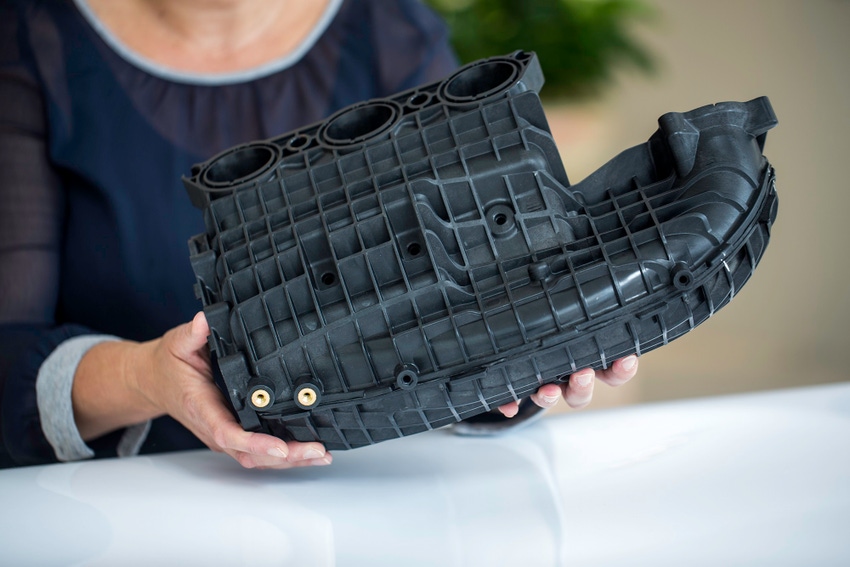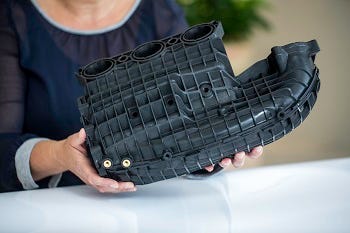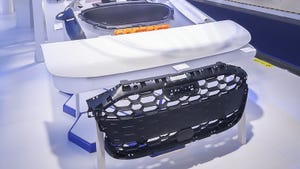Plastic air intake manifold with integrated charge air cooler
A recently-introduced hybrid sports car features the world's first high-heat plastic air intake manifold (AIM) with integrated charge air cooler (CAC). The engineering plastic used in this application is a high temperature-resistant polyamide (PA) 46 from the Stanyl Diablo range of DSM Engineering Plastics (Singapore).
July 22, 2014

A recently-introduced hybrid sports car features the world's first high-heat plastic air intake manifold (AIM) with integrated charge air cooler (CAC). The engineering plastic used in this application is a high temperature-resistant polyamide (PA) 46 from the Stanyl Diablo range of DSM Engineering Plastics (Singapore).
The injection-molded manifold operates at 220°C and withstands pulses of high internal pressure. DSM worked closely together with a leading system supplier to develop the AIM/CAC combination, with DSM providing extensive development and processing support.
|
The world's first high-heat plastic air intake manifold (AIM) with integrated charge air cooler (CAC) employs PA 46 that can withstand peak temperatures of up to 250°C. |
The grade employed is Stanyl Diablo OCD2100, which contains 40% glass fiber reinforcement as well as a specially developed and patented heat stabilizer. This grade has a continuous-use temperature of 220°C and is able to withstand peak temperatures up to 250°C.
The car incorporates a host of cutting-edge technologies that give it the performance of a top-level sports car but a carbon footprint lower than that of a compact city car. This is mainly thanks to its hybrid synchronous electric motor combined with a powerful turbocharged 1.5-L petrol engine.
The engine makes use of an extremely high turbo pressure that results in a very high internal air temperature. To cool down the air stream, the engine uses a liquid-cooled charge air cooler (CAC) which is integrated into the air intake manifold and delivers higher efficiency than an equivalent air-to-air cooler.
Integrating the CAC into the AIM reduces the air duct length and improves engine responsiveness. This makes it possible to deliver higher performance while still meeting the latest gas emission requirements. However, integrating the cooler into the AIM drives the internal air temperature up to 220°C in continuous use, with peaks up to 250°C. This increase in pressure and temperature puts additional demands on the manifold material.
Integrated high temperature AIM/CACs have been produced before, but they have typically incorporated metal components for the manifold. The car maker wanted a plastics solution in order to minimize weight and maximize the design flexibility to enable a highly functional assembly to fit into a small space.
Stanyl Diablo polyamide 46 delivers a weight reduction of up to 40% versus aluminum, and its optimized processing characteristics reportedly reduce system cost. It is also said to combine very good mechanical performance with outstanding high temperature resistance, retaining its high stiffness even under continuous-use temperatures of up to 220°C.
The AIM/CAC is assembled from several moldings using hot gas welding. In this respect, best-in-class weld strength means the assembly is highly resistant to pressure pulsation loads. In addition, parts are said to exhibit good dimensional stability and surface finish, despite the high level of glass reinforcement.
"With national laws everywhere clamping down on engine emissions, and car makers focusing more and more on energy efficiency, we expect the use of plastics air intake manifolds with integrated charge air coolers to increase globally," says Kurt Maschke, Global Segment Manager Air/Fuel, at DSM. "Stanyl Diablo OCD2100 out-performed the competition in this project, with its combination of high temperature resistance and weld line performance after aging. DSM can expect strong business with this material in that type of application in the future."
DSM claims to be a leader in the development of high temperature resistant thermoplastics for automotive engines. Diablo technology, developed and patented by DSM, is said to improve the long-term temperature resistance of materials such as the supplier's Stanyl PA that already possesses superior high-temperature performance than standard polyamides; and DSM is also using it to upgrade performance in its Akulon PA 6 materials. DSM also licenses Diablo technology to other high temperature thermoplastics suppliers.
About the Author(s)
You May Also Like



